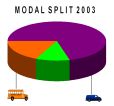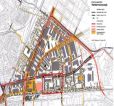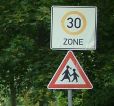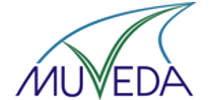| Traffic planning |
Mobility • Concepts • Determinations • Analyses • Efficiency
| Mobility surveys | |
 |
One of the most important objectives of traffic planning is to reduce traffic problems, if possible without the hindrance of the
mobility of citizens or the quality of land use of an economic area. For the identification of critical points we plan and
organise surveys concerning traffic behaviour in passenger and goods traffic, including household and enterprise surveys as
well as surveys of moving and stationary traffic. We analyse according to the particular transport mode and target group
specific questions like commuter traffic, volumes of trade and goods traffic as well as the specifics of recreational traffic.
|
| Traffic concepts | |

|
Suitable
traffic concepts
provide the basis for an effective and meaning- ful traffic policy in urban and regional areas as well
as on a national and international level. Within the framework of this field of activity we draft transport development and master
plans taking into consideration all transport modes and systems as well as individual adapted concepts for different road user
groups such as pedestrians or bicyclists. These also include network model calculations of future traffic volumes. Furthermore,
we identify infrastructural bottlenecks and analyse the influence of regulating and structural measures on traffic conditions.
|
| Impact assessments | |
 |
Within the framework of infrastructural measures it is necessary to assess and analyse traffic-related as well as transport economical impacts of these measures. With traffic studies we assess the changes of traffic volumes in passenger and goods traffic for the relevant traffic network. The so called physical effects like e.g. changes in accident rates and structure, emissions and immissions of air pollutants and noise, travel times in commercial and private field are disclosed in the macroeconomic evaluation of measures. This information also provides an important basis for an extensive impact analysis.
|
| Traffic safety analysis | |
 |
Over the last years measures to enhance traffic safety have been successfully carried out and shall now be continued and
intensified. This is the objective of the Federal Government as well as the European Commission, which is expressed in long-term
programmes for more safety in road traffic. Our activities in this field include collecting, editing and interpreting traffic
data as well as a detailed analysis of these data and their structure. Based on the analysis results and taking into account the
causes of accidents, we suggest solutions for the elimination of identified accident black spots in the road network. We assess
the monetary macroeconomic damage in consequence of road accidents and evaluate the macroeconomic benefit due to accident
avoidance through planned measures. The success of the realised measures is reviewed with ex-post analyses.
|
| Capacity studies | |
|
|
Due to the continuous increasing traffic volume it is of particular importance for traffic planning to avoid or reduce evolving
bottlenecks by suitable measures. The capacities of roads and particularly of junctions are decisive for traffic conditions.
Within the framework of capacity studies we carry out calculations for entries, crossroads and roundabouts as well as for
cross-sections and weaving sections. In addition to the general increase of traffic volume the road network in metropolitan
areas is frequently aggravated by special situations like e.g. big events or construction sites, which require innovative measures.
|



